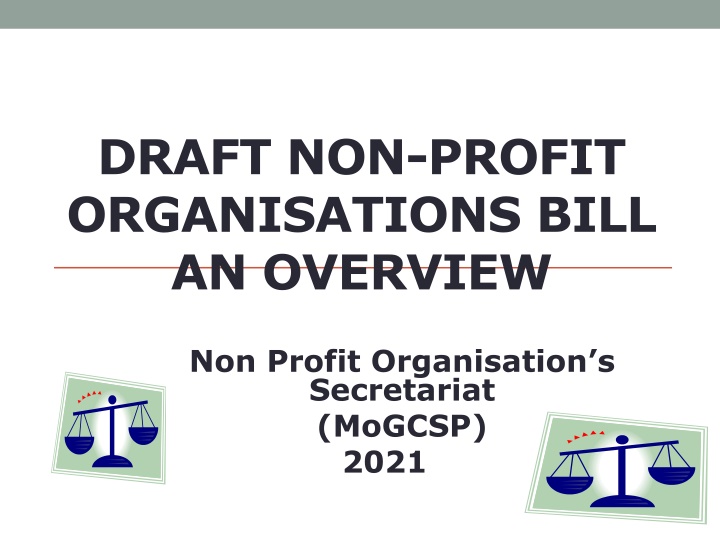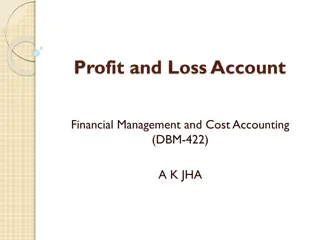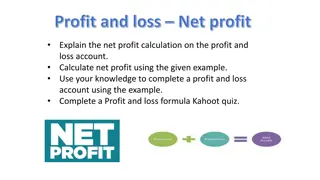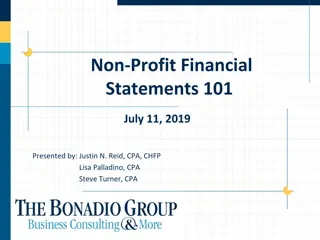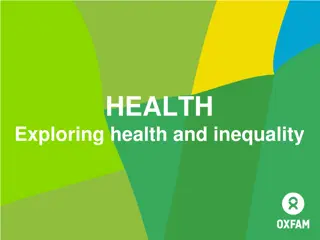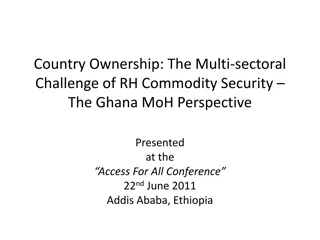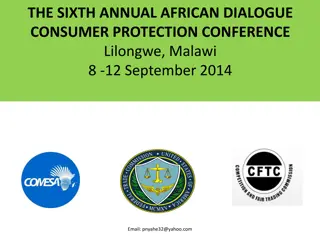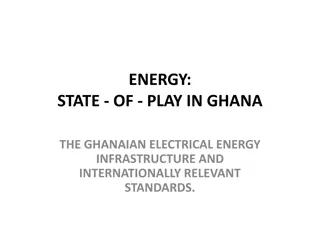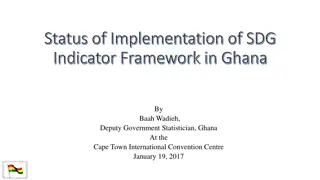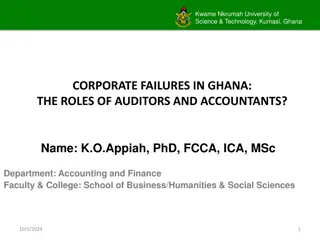Overview of Non-Profit Organisations Bill and Historical Background in Ghana
The article provides an in-depth overview of the Non-Profit Organisations (NPO) Bill in Ghana, highlighting its importance as a tool for development. It covers the challenges faced in the past regarding NPO regulation and outlines the historical background leading to the creation of the NPO Secretariat in 2021. The development of NPO policy, directives, and the need for an enabling environment are discussed. The article also delves into recommendations from international bodies like FATF and the EU, emphasizing the urgency of regulatory frameworks for NPOs in Ghana.
Download Presentation

Please find below an Image/Link to download the presentation.
The content on the website is provided AS IS for your information and personal use only. It may not be sold, licensed, or shared on other websites without obtaining consent from the author.If you encounter any issues during the download, it is possible that the publisher has removed the file from their server.
You are allowed to download the files provided on this website for personal or commercial use, subject to the condition that they are used lawfully. All files are the property of their respective owners.
The content on the website is provided AS IS for your information and personal use only. It may not be sold, licensed, or shared on other websites without obtaining consent from the author.
E N D
Presentation Transcript
DRAFT NON-PROFIT ORGANISATIONS BILL AN OVERVIEW Non Profit Organisation s Secretariat (MoGCSP) 2021
2 Presentation Outline Law as a tool for Development Historical Background NPO Policy & Directives NPO BILL 2021 Conclusion
3 Law as a tool for development NPOs are a force for social and economic development partners in nation building and national development valuable force to promote and consolidate democracy cut across sectors of the economy and society NPOs require an enabling environment collaborate and co-operate with government need an institutional framework
Historical Background In 1993, the Government came with an Non-Governmental Organisation(NGO) Bill but could not be implemented. In 2000, the government in partnership with the NGO sector also came up with the Partnership Policy and that also failed. In 2004, the 2000 Policy was updated but was not implemented. In 2008, the Trust Bill was developed for the NGO sector but it was also not accepted. In 2010, an NGO Bill was sent to Cabinet for consideration but it stalled.
Historical Background Contd In 2014, National Risk Assessment Exercise conducted by Financial Action Task Force(FATF) found the NPO sector to be vulnerable to money laundering and terrorist financing; Recommended the country to have a regulatory framework for the Non-Profit Organisation(NPO) sector to address the challenges and manage the operations of NPOs in the country. In 2016, a Mutual Evaluation undertaken by the Inter- Governmental Action Group Against Money Laundering in West Africa (GIABA), a specialised institution of ECOWAS revealed that the country does not have a Central Registration Authority for the registration and regulation of non-profit organisations.
Historical BackgroundContd In 2017, Ministry of Gender, Children and Social Protection formed a National Technical Committee to develop a legal framework for the NPO sector. The National Committee lead the Technical Team in the National Consultation that culminated in the development of the NPO Policy & Directives In October, 2020, Cabinet approved the Non-Profit Organisation Policy (2020) and the Directives for the Management of the Non-Profit Organisations Operations in Ghana (2020) leading to the establishment of the NPO Secretariat. NOTE: From 2014 to December 2020, FATF has put Ghana on the grey list of countries with lapses in their Anti-Money Laundering/Combating Financing Terrorism Legal framework. In 2020, the EU also placed Ghana on its blacklist.
Non Profit Organisations Policy Objectives of the Policy The main objective is to create an enabling legal/institutional framework and deepen democratic environment for NPOs to operate independently and contribute effectively to national development. Specifically, the Policy objectives are to: Maximize the contribution of the NPO sector to the socio- economic development of the country
NPO Policy.Contd Provide an operational definition of an NPO Establish a regulatory body for the NPO Sector Provide a Framework for NPO Regulation and Licensing Promote the independence, integrity and good governance of NPOs Provide oversight for Accountability and Transparency in the operations of NPOs Deepen the Freedom of Association, assembly and expression of NPOs
NPO PolicyContd Provide guidelines for dissolution of NPOs Ensure more cost-effective use of resources by all NPOs and agencies involved in financing their operations.
Definition, Nature and Classification of NPO A Non-Profit Organisation is a not-for-profit, non- governmental legal person or association or organisation voluntarily established, that primarily engages in mobilising and use resources for purposes such as charitable, religious, cultural, educational, social or communal purposes or for carrying out of other types of not for profit purposes and public good in the public interest.
Definition, Nature and Classification Cont d Any organization that is engaged in NPO activities as defined shall be required to comply with the provisions governing the activities of NPOs in Ghana. This includes; non-governmental, faith-based Organisations, associations and philanthropic organisations. A non-profit organisation may be local or regional, national or international, membership or non-membership based.
Directives for the Management of NPO Operations The Sector Minister, do hereby established a Non-Profit Organisation Secretariat referred to in these Directives as NPO Secretariat within the administrative structures of the sector Ministry to take over the registration and supervision role of the Social Welfare Department as well as play the vital role of facilitating and monitoring operations of NPOs in the country. The Directives are applicable to a not-for-profit, non- governmental legal person or association or organisation voluntarily established for purposes such as charitable, religious, cultural, educational, social or communal purposes or for carrying out of other types of not for profit purposes and public good in the public interest.
APPLICATION OF THE DIRECTIVES License institutions to operate as Non-Profit Organisations Maintain and publish a list of NPOs in good standing in the country. Establish standards, Directives and codes of practice in collaboration with the NPO sector. Adopt a risk-based approach in monitoring and supervising NPOs identified to be vulnerable to money laundering or terrorist financing. Liaise between Government and the NPO sector. Advise the Sector Minister on matters of policy relating to the NPO sector; and Collaborate with relevant domestic and international Law Enforcement Agencies in investigations and the sharing of information.
14 NPO BILL,2021 Purpose of this Bill is to provide for non-profit organisations in the public interest for socio-economic development. The Bill establishes a Non-Profit Organisation Secretariat as a central authority responsible for the NPO sector. Does not confer legal personality on an NPO, Non-profit organisations that require legal personality to sue and be sued and own property, will need to be incorporated under the Companies Act 2019 (Act 992). Is required to meet international peer review obligations of the Republic of Ghana e.g. money laundering, financing of terrorism NPOs are accountable institutions under the AML Act, 2020 (Act 1044) The Bill meets a requirement from the Financial Action Task Force (FATF) for legislation on the non-profit sector
15 Groups of clauses in the NPO Bill clause 1-7 deal with the general principles of non-profit organisations; Clause 8-16 deal with non-profit organisations, it details with the types of organisations and the fact that they may or may not be membership based Clause 17-25deal with the establishment of the Non-Profit Organisation Secretariat as an independent body, the object of the Secretariat; the key functions of the Secretariat; the establishment of committees for the Secretariat; the administration of the Secretariat. Clause 26-27deal with the nature and privileges of organisations Clause 28-42 deal with the licensing of organisations. Clause 43-47deal with the Secretariat having a dispute resolution process Clause 48-55 deals with the Non-Profit Organisations Fund. Clause 56-74 deals with the miscellaneous provisions.
16 NPO Secretariat NPO Secretariat as a central authority object of the Secretariat is to be responsible for non-profit organisations in the country. Key functions of the Secretariat 1. (1) To achieve its object, the Secretariat shall advise the Minister on policy and the NPO sector establish standards, licence NPOs and monitor their activities collect, compile and publish information investigate complaints, deal with grievances ensure public interest, accountability and transparency liaise between the NPO sector and government Publish an annual list of licenced organisations; (2) The Secretariat shall formulate policies necessary for the achievement of the object of the Secretariat. (3)The policy on organisations shall be reviewed at least every four years.
17 Offices of the Secretariat The Secretariat may establish and supervise local offices as it considers appropriate in the performance of its functions.
18 Appointment of Chief Executive The President shall, in accordance with article 195 of the Constitution, appoint a Chief Executive as the head of the Secretariat. The Chief Executive shall hold office on the terms and conditions specified in the letter of appointment. The Chief Executive shall be a person well versed in non-profit organisation matters with the qualification and experience relevant to the functions of the Secretariat.
19 Appointment of other staff The President shall, in accordance with article 195 of the Constitution, appoint for the Secretariat, other staff necessary for the efficient and effective performance of the functions of the Secretariat. Other public officers may be transferred or seconded to the Secretariat or may otherwise give assistance to it. The Secretariat may engage the services of advisers and consultants for the efficient and effective performance of the functions of the Secretariat.
20 Nature and Privileges of non-profit organisations An organisation shall not generate a profit other than for use to further its objectives. An organisation maybe voluntarily established by individuals in the exercise of their right to freely associate for any lawful purpose in accordance with article 21 of the Constitution. An organisation shall not be used to finance terrorists or engage in other criminal acts. An organisation shall be institutionally independent and autonomous of government and shall have its status respected by the government if it operates within the law. An organisation may be community based, local, foreign or international.
21 Privileges of organisations (1) An incorporated organisation may apply in writing to the Secretariat to be licenced and once licenced, shall enjoy the privileges, benefits and facilities provided under this Act if the organisation i. has operated for a minimum of twelve months; ii. submits audited annual reports of its activities to the Secretariat; and iii. updates the information on the organisation. 2) A registered organisation may obtain collections from the public to further its objectives. 3)A public collection shall be made in accordance with the guidelines issued by the Secretariat for that purpose.
Privileges of organisations..cont.d (4) A licenced organisation may: a)receive or be the beneficiary of grants, sponsorships and other financial aid from the government, any entity controlled by the government or the Fund; (b) be the beneficiary of policies that support voluntary action developed by the government; (c) receive or be the beneficiary of an exemption, privilege or other entitlement whether financial or otherwise; (d) be a party to a contract and other engagement, whether remunerated or not, to carry out of services to achieve its objectives at the request of the government or any agency controlled by the government. (5) Failure to renew the licence of an organisation shall result in the loss of privileges.
23 Abusive use of certificate of licence Secretariat may: Prohibit NPO from abusing licencing certificate Issue a public statement to warn the public Apply to court to seize money raised or pay money into the NPO Fund Secretariat to notify person who has abused the certificate Offending person may make a submission to the Secretariat and file a petition Secretariat to deal with the petition within a time frame
24 Dispute resolution Secretariat to have dispute resolution process NPO has a right to petition, decision to be in 21 days types of dispute include: Between members, members and directors About membership fees, expulsion Between founders and directors, between directors, between organisations Volunteers and NPO If between employee and NPO to be referred to the National Labour Commission
25 NPO Fund Fund is to ensure that the Secretariat can promote the interest of NPOs Object is to provide financial assistance to a licenced NPO i.Continuing education in the non-profit sector ii.Strengthen management systems of NPOs iii.Provide financial grant to an NPO Has a Fund Management Committee Standard provisions on sources, management, bank account, and audit annual report
Conclusion National Consultation underway on the Bill Inputs & Recommendations will be submitted to AG National Technical Committee will Review Validation Submission to Cabinet for its Consideration MoGCSP Submit Bill to Parliament
27 The End THANK YOU
